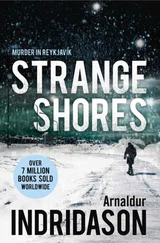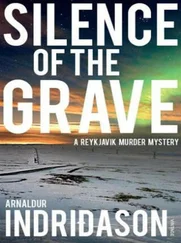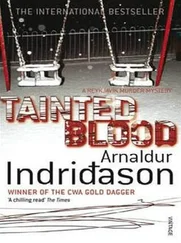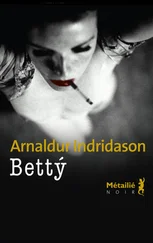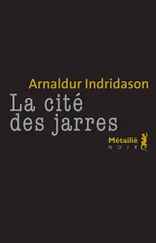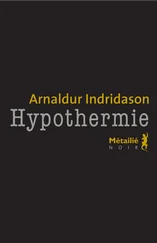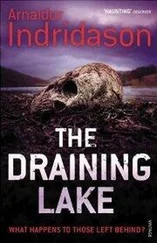“Do you miss Marion?” Elinborg asked.
They stepped outside into the bitter cold. Erlendur stopped and pulled his coat tight around him. He had not had time to consider the question until suddenly confronted by it now. Did he miss Marion?
“I do,” he said. “I miss Marion. I’ll miss—”
“What?” Elinborg said when Erlendur broke off in mid-sentence.
“I don’t know why I’m burdening you with this,” he said and walked towards his car.
“You’re not burdening me,” Elinborg said. “You never do,” she added, in the belief that Erlendur would not hear.
“Elinborg,” Erlendur said, turning.
“Yes.”
“How’s your daughter? Is her gastric flu any better?”
“She’s perking up,” Elinborg said. “Thanks for asking.”
They arrived at Andres’s place shortly after dinnertime. He was at home, rather the worse for wear but not too drunk to hold a conversation. The police had released him after the initial interview; they did not have sufficient grounds to detain him any longer. He let them in with a grin that immediately got on Erlendur’s nerves. Sigurdur Oli closed the door behind them. He had spent the best part of the day looking for leads that might help them trace Gestur but had found nothing on him in the police records and was feeling tired. Elinborg had gone home. It was dark in Andres’s flat and there was a suffocating odour of cooking, almost a stench, as if he had been eating putrefied skate with dripping. They stood in the living room. Andres sat down in front of the television. Beer cans littered the table beside him and empty schnapps bottles lay overturned on the floor. He sat with his back to them, glued to the television as if they did not exist. The sole illumination was the flickering glow of the screen. Only the top of his head was visible over the high back of the chair.
“How’s it going?” Andres asked. He picked up a beer can, took a swig and belched.
“We found him,” Erlendur said. “Your old stepfather.”
Andres slowly replaced the beer can.
“You’re taking the piss.”
“He calls himself Gestur. Lives in the same block of flats as the boy who was attacked.”
“So what?”
“You tell us.”
“What do you mean?”
“Where is he?”
“Hang on a minute, didn’t you just find him?”
“We found his flat,” Erlendur said.
Andres reached out for the beer again.
“But not him?”
“No,” Erlendur said.
There was a silence.
“You’ll never find him,” Andres said.
“Do you know where he is?” Erlendur asked.
“What if I do?”
“Then tell us,” Sigurdur Oli said angrily.
“Did you go inside his place?” Andres asked.
“None of your business,” Erlendur said.
“What was his flat like? Was it anything like mine?” he asked, extending the hand with the beer can, as if to invite them to admire the dump that was his home.
“We can bang you up for obstruction,” Sigurdur Oli said.
“Can you now?”
“And for refusing to testify,” Sigurdur Oli said.
“Ooh, I’m shitting myself,” Andres said.
“Do you know who he is?” Sigurdur Oli asked.
“You’ve drawn a blank, and now you expect little Andy to save your bacon,” he said. “Is that it? Is that what you expect? Cop wankers. When have you ever helped anyone?”
Erlendur looked at Sigurdur Oli. He mouthed the words “little Andy” and shook his head, as though mystified.
“What name was he using when you knew him?” Erlendur asked.
“He called himself Rognvaldur,” Andres said. “He was known as Rognvaldur in those days. You’ve been in his flat, haven’t you? You won’t find anything. You won’t find out anything about him. You don’t know who that man is. Only little Andy can help you. But let me tell you something: Andy’s not going to help you. Little Andy’s not going to lift so much as a little finger. Do you know why?”
“Why?” Erlendur asked.
“What’s all this “little Andy” crap?” Sigurdur Oli asked, seizing Andres’s chair and dragging it round from the television. Erlendur grabbed at Sigurdur Oli to prevent him but it was too late. The chair swivelled slowly round until Andres was staring up at them.
“You bloody idiot!” Erlendur yelled at Sigurdur Oli.
“You tell him, mate!” Andres cackled.
“Wait outside,” Erlendur ordered.
“What?” Sigurdur Oli began to object but shut up at once. After staring first at Erlendur, then at Andres, he walked out without another word. Andres jeered.
“Yeah, get out of here,” he called after him.
“Why won’t you help us?” Erlendur asked when Sigurdur Oli had gone.
“It’s none of your business what I do,” Andres said, turning back to the glare of the television.
“Are you lying to us, Andres?”
The glow from the screen flickered over the little flat, illuminating the squalor and neglect. Erlendur felt uncomfortable. There was nothing here but self-destruction.
“I’m not lying,” Andres said.
“What kind of man is he, this bloke who calls himself Rognvaldur?” Erlendur asked. “Who is he?”
Andres did not answer.
“You told us you had seen him again recently. Do you know where he is?”
“I haven’t a clue,” Andres said. “I’m not going to help you with this. Do you understand?”
“When did you first notice him in the neighbourhood?”
“A year ago.”
“And you’ve been watching him ever since?”
“I’m not going to help you.”
“Do you know where he works? What he does during the day? What he does for a living? Does he work?”
Andres did not answer.
Erlendur reached into his pocket and took out the photograph of the man who had gone by the name of Rognvaldur when he lived with Andres’s mother. He took another brief glance at the face of the man he was looking for, then held the picture over the high back of the TV chair. Andres took it.
“Is that him?” Erlendur asked.
Andres did not answer.
“Do you recognise the man in the photograph?”
“That’s him,” Andres said at last.
“Did he look like that when you knew him?”
“Yes, that’s him.”
“What kind of man is he?” Erlendur repeated. “What can you tell me about him?”
Andres did not reply. Erlendur could see nothing but the top of his head over the chair but guessed that he was holding the picture in front of him.
“Is he capable of killing a child?” Erlendur asked.
Some time passed, then the chair began to swivel round from the television again and Andres reappeared. He was no longer grinning. His face wore a drawn, sober expression as he met Erlendur’s eye. He handed back the picture.
“I believe he’s capable,” Andres said. “Maybe he already did. Years ago.”
“What do you mean? Maybe he did what?”
“Fuck off. You’re not getting any more out of me. Get out of here. This is my affair. I’ll sort it out.”
“What did he do?”
“Fuck off and leave me alone,” Andres said.
“Are you saying he’s a murderer?”
Andres turned back to the television and, despite all his attempts, Erlendur could not extract another word from him about the man who lived on Sunee’s landing.
One of the younger employees at the recycling depot was feeling quite satisfied with his day. He had found two vinyl records that were well worth keeping. Of course, he was supposed to hand them in to the market at which useful goods from the recycling depot were sold, instead of taking them home with him. But no one kept tabs on what people salvaged from the dump. In fact, anybody could wander round the depot and have a rummage. Sometimes record collectors almost ended up in the crusher. Book collectors too. All sorts. Later he would take the two records to a collectors” shop and get a good price for them. He was not especially interested in records or music but after working for two years at the depot he knew what was valuable. One day he had come across a whole set of golf clubs by the scrap-metal container, which someone had forgotten to put back in the car after throwing away their rubbish. The bag was rather tatty but otherwise the set was in excellent condition and he sold it later for a tidy sum. He got an especially good deal on the “driver’. Two days after he found the set the owner came looking for it but the poor man was easily fobbed off with the lie that unfortunately the clubs had probably ended up in the rubbish.
Читать дальше


